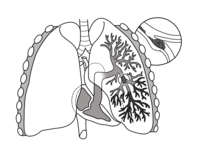
Photo from wikipedia
Pulmonary venous thrombosis (PVT) is a rare but potentially devastating disease state with a largely unknown incidence. The most common etiologies of PVT are secondary to complications of lung surgery,… Click to show full abstract
Pulmonary venous thrombosis (PVT) is a rare but potentially devastating disease state with a largely unknown incidence. The most common etiologies of PVT are secondary to complications of lung surgery, malignancy, catheter ablation for atrial fibrillation, and idiopathic causes. Diagnosis can be challenging because presenting symptoms often are vague and nonspecific, or even asymptomatic, and traditional diagnostic modalities, such as chest radiography and arterial phase computed tomography scans, are poor techniques for diagnosis. The authors present a case of a patient presenting for pulmonary thromboendarterectomy for a presumed diagnosis of chronic thromboembolic pulmonary hypertension who was found incidentally to have a PVT, on intraoperative transesophageal echocardiography. Due to significant thrombus burden, the new finding of PVT, and known association of PVT and malignancy, a biopsy of mediastinal lymph nodes was obtained, which revealed metastatic cervical carcinoma. The pulmonary endarterectomy procedure was aborted.
Journal Title: Journal of cardiothoracic and vascular anesthesia
Year Published: 2021
Link to full text (if available)
Share on Social Media: Sign Up to like & get
recommendations!